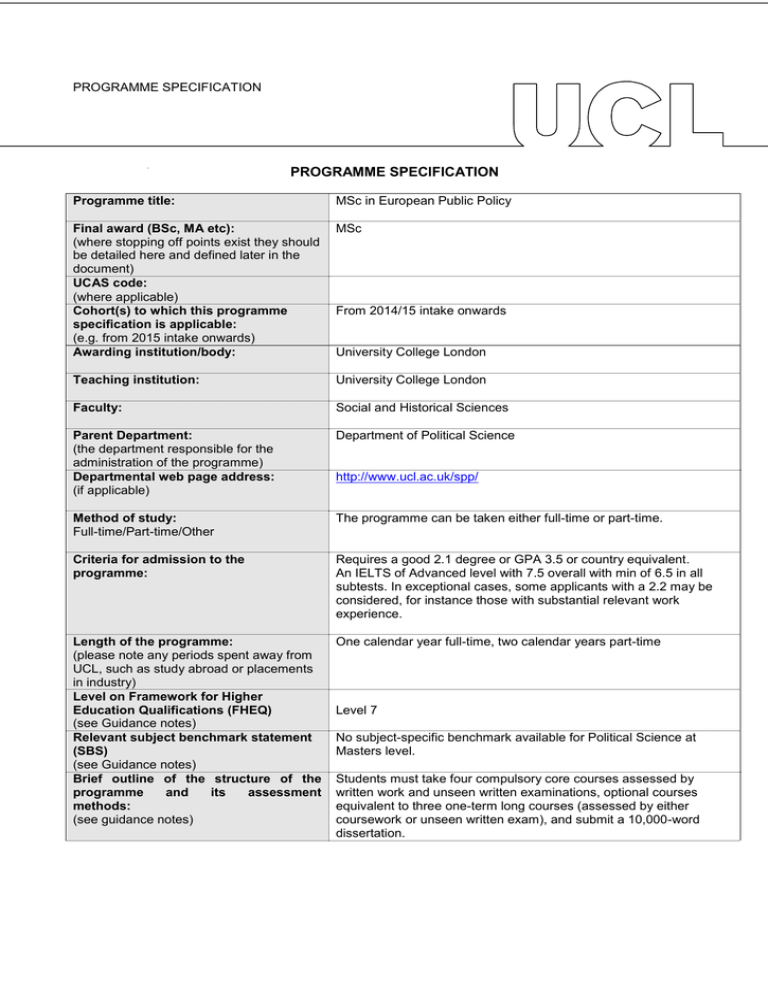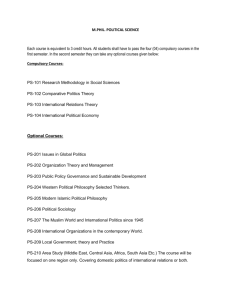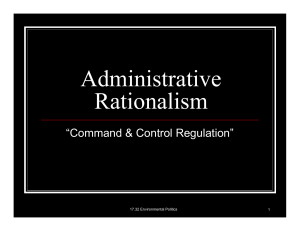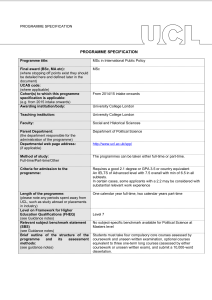PROGRAMME SPECIFICATION
advertisement

PROGRAMME SPECIFICATION PROGRAMME SPECIFICATION Programme title: MSc in European Public Policy Final award (BSc, MA etc): (where stopping off points exist they should be detailed here and defined later in the document) UCAS code: (where applicable) Cohort(s) to which this programme specification is applicable: (e.g. from 2015 intake onwards) Awarding institution/body: MSc Teaching institution: University College London Faculty: Social and Historical Sciences Parent Department: (the department responsible for the administration of the programme) Departmental web page address: (if applicable) Department of Political Science Method of study: Full-time/Part-time/Other The programme can be taken either full-time or part-time. Criteria for admission to the programme: Requires a good 2.1 degree or GPA 3.5 or country equivalent. An IELTS of Advanced level with 7.5 overall with min of 6.5 in all subtests. In exceptional cases, some applicants with a 2.2 may be considered, for instance those with substantial relevant work experience. Length of the programme: (please note any periods spent away from UCL, such as study abroad or placements in industry) Level on Framework for Higher Education Qualifications (FHEQ) (see Guidance notes) Relevant subject benchmark statement (SBS) (see Guidance notes) Brief outline of the structure of the programme and its assessment methods: (see guidance notes) One calendar year full-time, two calendar years part-time From 2014/15 intake onwards University College London http://www.ucl.ac.uk/spp/ Level 7 No subject-specific benchmark available for Political Science at Masters level. Students must take four compulsory core courses assessed by written work and unseen written examinations, optional courses equivalent to three one-term long courses (assessed by either coursework or unseen written exam), and submit a 10,000-word dissertation. Board of Examiners: Name of Board of Examiners: PUBLG – Public Policy Board of Examiners Professional body accreditation (if applicable): N/A Date of next scheduled accreditation visit: EDUCATIONAL AIMS OF THE PROGRAMME: The programme (a) provides an in-depth and systematic understanding of the European Union (EU)'s institutions, political processes and policies; (b) situates this empirical knowledge within theories of European integration, comparative politics and public policy; and (c) equips students with the analytical competence, research experience and generic skills necessary to analyse and normatively assess the main issues facing European policy-makers today. PROGRAMME OUTCOMES: The programme provides opportunities for students to develop and demonstrate knowledge and understanding, research and generic skills in the following areas: A: Knowledge and understanding Knowledge and understanding of: 1. how institutions and political processes operate in the EU, and how the EU impacts on the institutions and political processes of its Member States; the programme looks in particular at judicial politics, decision-making, interinstitutional relations, executive-legislative relations and political representation; 2. how policy-making and political processes operate in the EU and how policy-making and politics have been transformed at the national level; the programme looks in particular at democratic representation, interest intermediation, the implementation of public policies and core policies such as the Single Market, internal and external security as well as welfare; 3. how institutions, political processes and policies are theorised and assessed normatively; the programme looks in particular at theories of judicial and legislative politics, theories of agendasetting, decision-making and delegation, theories of political representation as well as theories of policy-making and Europeanisation; Teaching/learning methods and strategies: Acquisition of 1 through weekly lectures and seminars. Several courses, especially the compulsory course The European Union: Institutions and Politics, and the optional core course The European Union, Globalisation and the State. The compulsory course emphasises the functional and normative dimension of politics at the supranational level; the optional core course explains whether, why and how established political systems and patterns of policy-making have changed in the face of European and global pressures. Acquisition of 2 through the above mentioned compulsory and core optional courses. Additionally, the optional courses Policy-making and Regulation in Europe, The European Union in the World and other policy-related courses all emphasise the theory-guided analysis of policy-processes and outputs. Acquisition of 3 and 4 through the compulsory and optional core courses as well as the optional courses and the dissertation. 4. the analytical and theoretical skills necessary to analyse political processes and to assess them normatively; the method of comparison and case selection; hypothesis testing/ generation and empirical analysis. Assessment: Students are assessed by a variety of methods: ‘unseen’ examinations, essays, assignments (e.g. policy-briefs) and a dissertation. The last mentioned is a required method of assessment. B: Skills and other attributes Intellectual (thinking) skills: The programme aims to help students: (a) to approach the study of European politics in a rigorous, systematic and theoretically informed way, and to question the premises of political analysis; (b) to collect and use empirical evidence in a systematic way and to question the explanatory power and reassess the validity of authoritative works in political science, particularly in comparative politics and public policy; Teaching/learning methods and strategies: Acquisition of (a) to (c) is fostered in all core courses offered in the programme, which train students to develop a conceptually and empirically informed understanding of European politics and policies; to become aware of the main theories in political science and to question their premises; to use the method of comparison; and to critically assess the validity of empirical evidence. (c) to develop a normative understanding of political processes and policies in the EU and its Member States. Assessment: Students are assessed by a variety of methods: ‘unseen’ examinations, essays, assignments (e.g. policy-briefs) and a dissertation. The last mentioned is a required method of assessment. C: Skills and other attributes Practical skills (able to): This programme aims following practical skills: Teaching/learning methods and strategies: to train the (a) to gain in-depth knowledge of EU politics, institutions and policies; (b) to acquire in-depth knowledge of the politics, institutions and policies of the EU's Member States; (c) to communicate effectively in writing; (d) to listen to and debate ideas, theoretical approaches and evidence during seminars; (e) to gain presentation skills through (non-assessed) seminar presentations and debates; (f) to use data-bases, digital and web resources, word-processing programmes and statistical packages; (g) to practice research and data collection as well as the use of documents from national governments and the EU; (h) to choose dissertation topics independently; (i) to develop a research strategy and a working hypothesis; (j) to learn an appropriate methodology for testing or generating hypotheses; (k) to adapt working hypotheses in light of empirical evidence and its interpretation; (l) to manage learning and research effectively. (a-b) through weekly lectures and seminars; (c) through the writing of essays, assignments and dissertations; (d-e) through seminar debates, presentations and policysimulations; (f-k) through independent research for essays and dissertations, through individual discussion with the course tutor, through all core and optional courses, in particular through the systematic training in qualitative and quantitative research methods; (l) through independent reading, study and research. Skills will be taught mainly in the compulsory course The European Union: Institutions and Politics and in the optional core courses The European Union, Globalisation and the State as well as Policy-Making and Regulation in Europe. Research skills in particular will be conveyed in the compulsory courses (Advanced) Qualitative and (Advanced) Quantitative Research Methods. All courses are taught by scholars who have specialised knowledge in the institutions, politics and policies of the EU and its Member States as well as in research methods, and who have carried out theoretical and empirical research in the field. Seminars and individual discussion will also provide instructions on research design as well as on data sources, collection and analysis. Assessment: (a-d) and (g-l) through ‘unseen’ examinations, long essays and dissertation. The latter is a required method of assessment. D: Skills and other attributes Transferable skills: Teaching/learning methods and strategies: The programme will encourage students to: (a-c, f-n) long-essays, course work, dissertation; (b) reading academic works on politics, comparative politics and public policy; (c) submitting word-processed written work, using data bases, consulting on-line library catalogues, using website material; (c-f, i-l) seminar presentations and class debates, research exercises and policy-simulations, a study trip to and engagement with policy-makers in Brussels. (a) write high quality essays and dissertations; (b) improve students’ knowledge of politics in general and of comparative politics and public policy in particular; (c) use computer resources and information technology; (d) present (non-assessed) material orally; (e) listen and contribute in class; (f) understand and assess contending ideas and arguments; (g) study a variety of written and digital materials available from libraries and data bases; (h) familiarise themselves with documents of governments and international organisations; (i) reflect on their own normative ideas by becoming acquainted with alternative points of view; (j) make original contributions to the study of politics, public policy and comparative politics; (k) understand and critically assess empirical evidence and develop appropriate methods to test or generate predictions; (l) think both positively and normatively about politics. Assessment: Students are assessed by a variety of methods: ‘unseen’ examinations, essays, assignments (e.g. policy-briefs) and a dissertation. The last mentioned is a required method of assessment. The following reference points were used in designing the programme: the Framework for Higher Education Qualifications: (http://www.qaa.ac.uk/en/Publications/Documents/qualifications-frameworks.pdf); the relevant Subject Benchmark Statements: (http://www.qaa.ac.uk/assuring-standards-and-quality/the-quality-code/subject-benchmark-statements); the programme specifications for UCL degree programmes in relevant subjects (where applicable); UCL teaching and learning policies; staff research. Please note: This specification provides a concise summary of the main features of the programme and the learning outcomes that a typical student might reasonably be expected to achieve and demonstrate if he/she takes full advantage of the learning opportunities that are provided. More detailed information on the learning outcomes, content and teaching, learning and assessment methods of each course unit/module can be found in the departmental course handbook. The accuracy of the information contained in this document is reviewed annually by UCL and may be checked by the Quality Assurance Agency. Programme Organiser(s) Dr Christine Reh Name(s): Date of Production: May 2014 Date of Review: December 2014 Date approved by Head of Department: December 2014 Date approved by Chair of Departmental Teaching Committee: Date approved by Faculty Teaching Committee December 2014 January 2015








